Mar 31, 2025
Mar 31, 2025
by H.N. Bali
No man is truly great who is great only in his life-time.
The test of greatness is in the page of history. − William Hazlitt
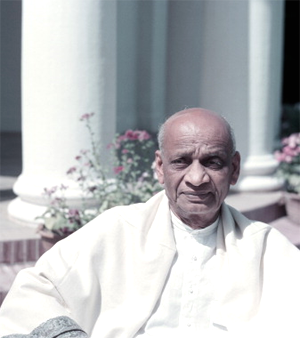 Narnendra Modi has the penchant of stirring some hornet’s nest or the other by his outspoken pronouncements. After being nominated as BJP’s Prime Ministerial candidate, in his very first public rally at Rewari, he announced his intention to put up a Statue of Unity to honor Sardar Patel. When erected it will be the world’s tallest memorial in honor of a man, whom he reckons was the tallest of the lot that were around, including Gandhi at the time India gained Independence.
Narnendra Modi has the penchant of stirring some hornet’s nest or the other by his outspoken pronouncements. After being nominated as BJP’s Prime Ministerial candidate, in his very first public rally at Rewari, he announced his intention to put up a Statue of Unity to honor Sardar Patel. When erected it will be the world’s tallest memorial in honor of a man, whom he reckons was the tallest of the lot that were around, including Gandhi at the time India gained Independence.
My esteemed friend, Rajender Puri whom I’m privileged to know for half a century and have great admiration for his professional integrity – rare among the present crop of journalists - has, in the columns of this website, expressed his “serious objection to the proposal”. May I – though no match to my friend’s first-hand knowledge of the polity – express my unequivocal support to the Modi proposal? I strongly believe Patel deserves this long long-due homage of a grateful nation which owes an inestimable debt of gratitude to the man and the dedication he brought to bear upon the task of laying the foundations of a strong modern India.
Patel’s Failings?
Puri mentions that among Patel’s failings, the fact that Gandhi “was assassinated thanks to ignored security measures during Sardar Patel’s tenure as Home Minister.” This is not true. Patel was deeply aware of the resentment that the people displaced from their hearths and homes, had against Gandhi for his last-minute acceptance of the June 3, 1947 plan to partition the country. He told Gandhi that he was planning to provide a security cordon around Birla House. Gandhi was dead against any such proposal at his prayer meetings and won’t let Patel arrange one.
The real gravamen of Puri’s accusation is Patel’s role in the partition of India. “These leaders (i.e. the Gandhi-Nehru-Patel triumvirate) mainly Sardar Patel, united Bharat but they divided India. They divided India without the slightest justification. They divided India because they allowed themselves to be influenced and manipulated by the British.”
Puri’s charge is that Patel, like his contemporaries then at the helm of affairs “violated their solemn pledge to the people of India by accepting Partition.” Those who have searched with fine-toothed comb the developments of the pre-partition years ultimately veer around to the view that, given the circumstances obtaining then, the choice was between a protracted spell of utter chaos or the partition of India.
Who’s the Real Culprit?
Over the years it has been discussed and debated: who was the architect of partition? Iqbal? Jinnah? Gandhi? Nehru? Patel? The Congress party? The Muslim League? The Hindu Mahasabha? The British? No one person and no single party can, I reckon, take the entire credit or the discredit for partition. It was a deadly serious game that had many players. The principal figures involved therein, acquired an iconic status both in India and Pakistan. Often the hero of one is a villain for the other, so bitter has been the experience of partition. Sixty-five years later, when one looks at them as historical figures, one finds them to be all too human, with their prides and their prejudices, their strengths and their limitations. They made choices like all humans and these choices had the human touch of triumph and tragedy. They were as much creators of history as were the victim of the historical process.
Nehru was consistent, but consistently unrealistic on the communal issue. He claimed to be a statesman but his statesmanship failed him at critical moments. In 1937, he tried to crush the League in UP. The result was exactly the opposite. It only crushed the pro-Congress elements in the League and forced them into a communal corner. A cooperative hand extended at that critical juncture might have paid rich political dividends. His passion for secular socialism made him insensitive to the depths of communal suspicions in the subcontinent. This failure showed up repeatedly in Nehru’s political career, first in the Nehru report of 1928, then in his decisions following the 1937 elections, and finally, and most importantly, his sabotage of the British Cabinet Mission plan in 1946.
The series of his failures had a decisive impact on the events leading to partition. He had a political stature of his own, next only to that of Gandhi, and the subcontinent paid a heavy price for his misjudgments. Maulana Azad observers in India Wins Freedom: “Jawaharlal’s action (in refusing to give two ministerial seats to the League) gave the Moslem League in the U.P. a new lease of life. All students of Indian politics know that it was from the U.P. that the League was reorganized. Mr. Jinnah took full advantage of the situation and started an offensive which ultimately led to Pakistan.”
Despite Gandhi’s opposition, most of the senior leadership in Congress supported the Cabinet Mission Plan in the hope that India could be kept united. On July 7, 1946 the Congress did pass a resolution largely accepting the Plan. However, a fateful event intervened. On July 10, 1946, during the question and answer session following a news conference in Bombay, Pandit Nehru stated that the Congress party was not bound by the stipulations of the Cabinet Mission Plan. Nehru was the newly elected President of the Congress and his statement was the bombshell that destroyed the Cabinet Mission Plan. Jinnah called a meeting of the League working committee to discuss the Congress rejection of the plan. Meanwhile, the Congress working committee met and issued a lengthy statement in which it said that even though they had reservations about the Plan, they would abide by its stipulations. Jinnah saw in this wavering attitude of the Congress a harbinger of things to come. If the Congress could go back on its promises even while the British were in India, he asked, how the Muslims could have faith in their promises after the departure of the British. The League working committee rescinded its earlier acceptance of the Cabinet Mission Plan.
The failure of the Cabinet Mission Plan was the single most important milestone on the road to partition. And its chief architect was Nehru, and not Patel. Till August 1946 there was a possibility, however remote, that the Congress and the League would find a meeting ground to keep India united. That hope evaporated with the statement of Nehru and the consequent rescinding of the Plan by the League.
Who Rocked the Boat?
Gandhi was vehemently opposed to the Cabinet Mission Plan of 1946 and actively campaigned against it. His goal in life was independence of India but he was unwilling to share power with Jinnah to achieve it. Despite his opposition, the Cabinet Mission Plan was the last hope for keeping India united, giving a chance to the two great religious communities to work together. Nehru’s statement at the above-cited news conference in July 1946 that Congress had agreed only to participate in a Constituent Assembly but not the grouping of states into Zones A, B and C, effectively scuttled the Plan. Two months later, partition became a certainty. When it was time to make a decision and the Congress working committee considered the proposal for partition, Gandhi, who had steadfastly maintained that he would never agree to partition, himself recommended that the proposal be accepted. He would rather accept partition than a federal government under the Cabinet Mission Plan. This was the ultimate contradiction in Gandhi’s political career which historians will argue about for years to come.
With the collapse of the Cabinet Mission Plan, India took a tortuous and precipitous slide towards partition. The Constituent Assembly met but the League boycotted it. Weary of the mounting tensions in India and alarmed at the mutiny of the Royal Indian Navy, the British cabinet sent a new viceroy, Mountbatten to Delhi to arrange for a transfer of power. Since the League was boycotting the constituent assembly, Mountbatten invited Nehru to form a cabinet. Jinnah was furious. He saw this as proof of the duplicity of the British and connivance of the Congress. He called for “Direct Action Day” on August 16, 1946.
Last Nail in the Coffin
Until the 16th of August 1946, the leaders of the Congress and the League were in control of history. After that date it was history that was in control of them. The Direct Action day was conceived as a day of peaceful protests. But in the communally charged atmosphere of India any excuse was good enough to start a riot.
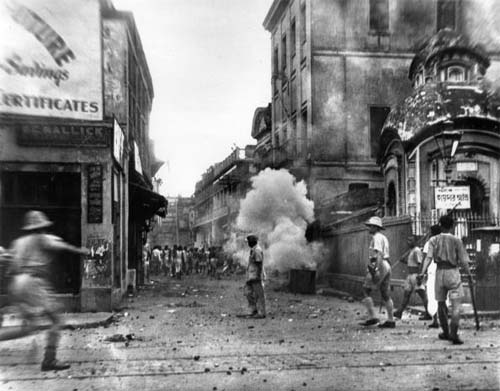
The Calcutta Riots - August 1946
The day passed peacefully in most parts of India but Calcutta was the scene of horrific riots with 6,000 dead and more than 20,000 injured. Some chroniclers have put the number of injured at over 100,000. Hindus, Muslims and Sikhs burned each other’s homes and stabbed innocent men, women and children. For five days, Calcutta burned. The army which was still under the control of the British did not intervene until it was too late. So ferocious were the riots that they destroyed whatever hope still lingered for a negotiated settlement of the Hindu-Muslim issue. H S Suhrawardy who was the Muslim League chief minister of Bengal played his own inglorious role.
Meanwhile, Jinnah realized that staying out of the cabinet would be a tactical error as it would give the Congress a free reign over policies at a time when the British were seriously contemplating a transfer of power. A coalition interim government was formed in October 1946. Pandit Nehru served as the prime minister of the interim government, Sardar Patel was the home minister, while Liaqat Ali Khan became the finance minister.
So intense was the animosity between the League and the Congress that the interim government became an arena for political one-upmanship rather than a platform for efficient administration. There was daily acrimony between the two sides. The League and Congress ministers held separate meetings. Instead of a give and take required in a democratic set up, each side sought to curtail the activities of the other. Liaqat Ali used his position as the finance minister to subject the Congress ministries to intense scrutiny. Bitterness grew among the cabinet members. Patel in particular was so embittered that he was won over to the idea of partition.
Mountbatten was eager to finish the job of power transfer and return to London for personal reasons. He was desperately keen not to lose the chance of heading Royal Navy as his father did on account of his German dissent. He pushed the idea of partition, converted Nehru and Patel to his point of view and sold the project to the British cabinet. A divided India was more to the liking of Churchill who was now the opposition leader in the British parliament.
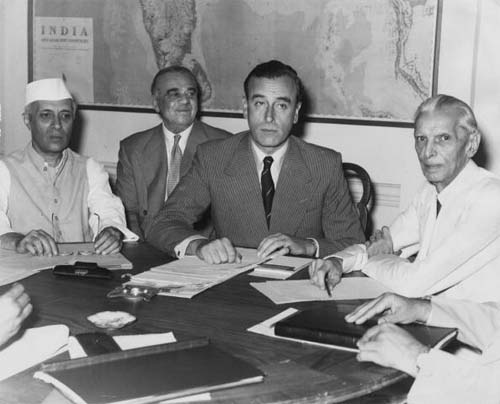
Nehru, Lord Ismay, Mountbatten, Jinnah discussing the partition plan
Jinnah was still under the impression that partition would bring the provinces of Punjab and Bengal in their entirety into Pakistan. It came as a shock to him when the Congress advanced the position in March 1947 that partition of the subcontinent would also mean a partition of the great provinces of Punjab and Bengal. Only the Muslim majority districts would be included in Pakistan. East Punjab and West Bengal would stay in India. The 572 princely states were given the option of acceding to either India or Pakistan keeping in view their geography and the wishes of their people. Jinnah argued passionately to keep Punjab and Bengal united in Pakistan but failed to convince Mountbatten of his position. Reluctantly, he agreed to “a moth eaten Pakistan”.
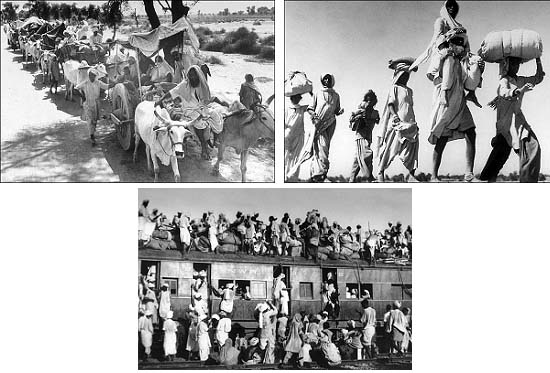
Partition of India, 1947
Widespread riots broke out in Punjab in March 1947. Ethnic cleansing on a scale rarely witnessed in human history was practiced on both sides of the new proposed border. No one knows how many innocent Hindus, Muslims, and Sikhs perished in the riots. Estimates range from half a million to two million. Entire villages were decimated. Towns went up in flames. Thousands of women and children were abducted and abused. Fifteen million refugees crossed the border. And the new nations of India and Pakistan came into existence immersed in flames of hatred and soaked in rivers of blood. They have fought three wars and a fourth war has been narrowly avoided.
Who’s Responsible?
Whom, then, do you hold responsible for the Partition? Gandhi, Nehru or Patel? Or Jinnah? All of them? In which case who more than others?
As the eminent British historian E H Carr pointed out in his famous study “What is History?”, as we argue over the “facts,” we must remember that the body of facts we have access to is already but a small selection of the whole, from which we further self-select some to prove our point of view. In this sense our understanding of the past is invariably vulnerable to distortion right from the beginning. Most of us seem content to see things in shades of black and white masquerading under convenient labels of our choice.
Often unvarnished truths of history get pronounced unawares. In his characteristic rhetorical style Jawaharlal Nehru said in a radio broadcast on June 3, 1947: “We are little men serving great causes”. The leaders of India, especially from the Congress, aware of the medium and long-term implications of the decisions they were hustled into, in 1947, by Tricky Dickie were indeed little men. Those who just didn’t have the prescience to look beyond their immediate objective of taking over from the departing British, were indeed, and most literally, little men, ill-equipped to serve the great causes that destiny had thrust upon the responsibility to address.
As a matter of fact the only one, who stands tall amidst the horribly short-sighted leadership of those crucial years, was Vallabhbhai Patel. He alone among his contemporaries clear-sightedly sensed the opportunity as the first Indian to do what Emperors of the stature of Ashoka and Akbar couldn’t do. And he did it and in just a few years i.e., to bequeath a unified India that never existed before as a political entity in our history of five thousand years. It is pity that the country was deprived of his transformational leadership so soon after Independence. That great minds weren’t around to give a new purposive sense of direction to the affairs of the subcontinent after dividing it, was the tragedy of those crucial years (1945-1947). Never in history of mankind have the blood and tears of millions been shed merely to satisfy the ego of some individuals as in India just before and after the transfer of power. It is a tragedy that we have not – much to our misfortune – taken tragically; nor learnt a lesson or two from it.
Continued to "Best Prime Minister We Never Had"
Images (c) Gettyimages.com
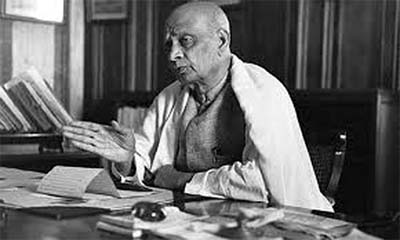
Sardar Patel Assessed (All the Links):
05-Oct-2013
More by : H.N. Bali

|
I agree with the opinions expressed by Mr. Bali in describing the leaders and events around the time of India's and Pakistan's Independence. I also agree with Mr. Bali's conclusion that Sardar Patel is the tallest of them all. I need some clarification though, when he says tallest of them all, does the word all include Mahatma Gandhi or excluding the Mahatma. |

|
Indian leaders were not true to the people those who were in the helm of the affairs they were second grade native colonial rulers. |

|
All well said. I have earlier said Sardar statue must be and should be built. Common main steam is voting, that we are waiting for. Earlier the better Main problem is corruption, over population and pollution. Education is the answer. Educate the people...whom to vote and whom not to vote. For this use fair means tovo convey the people whom to vote and not to vote. How are we going to correct our selves? Educate our selves..when. Now time is ripe. Tell them, using fair means, whom to vote for our betterment. Now and now, without loss of time, keeping Rahul and Narendra Modi aside. |

|
Dear Mr. Bali, I am not aware about the "cabinet mission plan" and plan about "grouping of states into Zones A, B and C " as mentioned in this article. I don't recall having studied this in text book during my schooling as well. Could you please through some light in this ? Although a Google search can be done, but it will be better if you could put it here as addendum in your own words. |

|
The last line in this article tells the tale that we will keep committing mistakes as we have least interest to learn from them.The other point the article addresses is who is responsible for the partition?As everyone knows, nehru wanted power, manipulated Gandhi so as to put himself in contention.fortunately he was the younger one in the movement leading to independence, well placed with his family back ground sort of Indian aristocracy and gandhi's whole some backing.So if he could not see the bloodshed, then the blame squarely rests on him as the leader of the pack who clearly demonstrated his ambitions.Rest like Jinnah/muslim league played their part.Once India gained independence,Nehru reverted to alien ideal of secularism clearly weaning towards appeasement of muslims as they formed a united chunk in vote banks.To blame sardar as Rajinder has done is sheer idiocy short on facts.I read that article rajinder wrote and I understood rajinder to be a man with a chip on his shoulder.Only people who are close to him will know what is bugging him. |

|
Dear RDASHBY, Hindu and Muslims co-existed for centuries in history of India, although the Hindu & Muslim kings fought wars, at time for religion. It is the British who sowed seeds of religion and caste based identities. It were British that divided Bengal into East and West Bengal states based on religion. It was British rule under which communal riots took place first. So, please don't be proud about British rule in India. They did nothing else and nothing more than ruining Indian culture, Indian manufacturing, Indian trades, Indian education system and so on, apart from looting the wealth from India. By 1945, there was hardly anything left to loot from India, hence the positive decision taken to leave the nation under compulsions of after world-war conditions. India survived... What we see today in India is because the corrupt and unworthy politicians carrying the British policy of "divide and rule". And one hope their days are going to get soon over. |

|
Our great freedom fighters---Mahatama Gandhi, Pandit Nehru, Subhas Bose, Sardar Patel, Bhagat Sinh........to my mind..Gandhi died by shot from Nathuram Godse....Nehru died after shock from defeat in China War.....Bose died whose death reason is not certain, he associated with Germany and Japan but he was true hero..he gave his life for Bharat Mata...Sardar Patel died because of various ailments, physical or mental. He united India without which we would have been (I shudder to think)...He was the Tallest of us. The Statue of Unity should and must be built in his honor..Worthy result for worthy cause. |

|
"When erected it will be the world’s tallest memorial in honor of a man ". Is building statues or living by his principles a nobler way. The proposal to build this statue spending 300 million pounds is a waste of money which could be spent for some drinking water project or poverty alleviation measure. Modi is an immature politician |

|
Under British Rule religion seemed never to be an issue, Hindus co-existing peacefully with Muslims, most apparently, as members of the older generation recall, in the cities, for example, Lahore. This was in part due to the polarity of Indian identity against that of the British ruling class. In fact, this experience of unity in a common cause sustained the concept of independence, and was of a single mind right until, that is, the British began to concede it, when the polarity that had lain dormant reverted to that between Muslim and Hindu, but this time on a level playing field; partition a political settlement for the absence of a formal declaration of war. In fact, the rioting was civil. The fury directed by each side on the other is inexplicable except in terms of a mutual accusation of betrayal of national identity by virtue of the mere presence of one in the other’s newly defined territory. |

|
I am just expressing my views in this regard. Sardar's statue is just incidental through which we can explore other dimensions. Sardar lived his life with complete justification & rendered his life also, which is undisputed. Regarding gandhi & nehru, controversy always prevails. partition is the most controversial dimension which cannot be explored with justification now. My view is based on the diluted, distorted, perversive reactions both in recorded & unrecorded dimensions in this regard. History is history but, this dimension is affecting our present. All characters played their significant role either justifiably or unjustifiably but, it is we who should correct this affected dimension. My only thought is "do we need history to correct ourselves"? Can't we analyse the present to correct ourselves? I do not believe in blame game either at individual or consequential dimensions. Let us correct the system which is at our reach. For this we need collective efforts with unbiased individuals as life is never independent, from individual to societal level. We have to co-exist with mankind & nature as one. Yardstick for degree of integrity is varying with the aloof mindset of society. It is the need of the hour to bring everyone on to a common mainstream. - [Indian Journalists Group - Linkedin] |